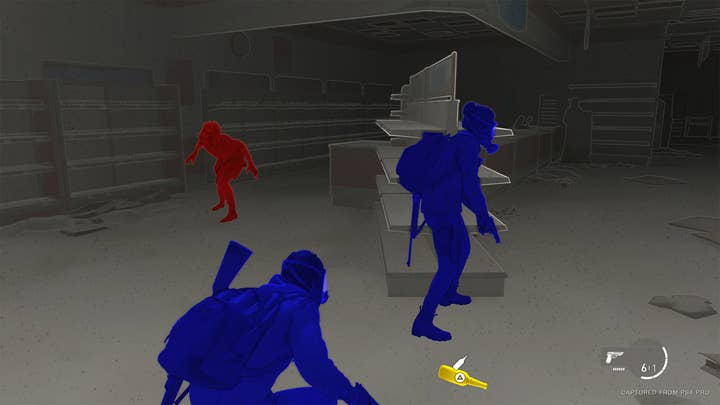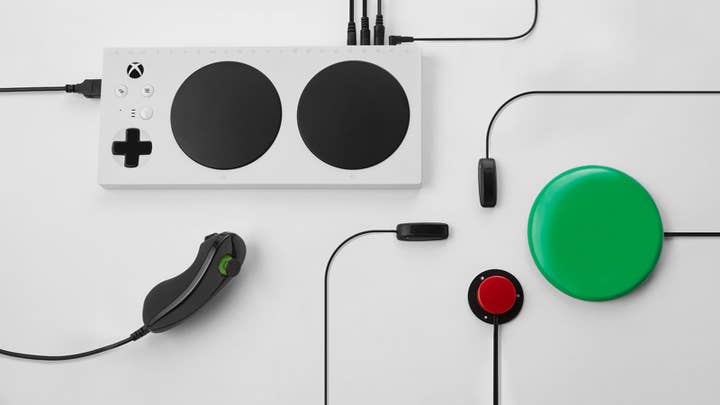Microsoft's accessibility guidelines are a great start -- but we can go further | Opinion
Video games should be open to everyone, allowing people to adjust experiences to suit their abilities must become the default
Anybody who wants to play games should be able to play games. That isn't, on the face of it, a controversial statement -- or at least it shouldn't be -- but it's not something that the games industry has done a terribly good job of living up to in the past.
For decades, the industry was criticised for seemingly always having its sights set narrowly on a very specific demographic. But for all the well-reasoned and ultimately successful arguments for looking beyond teenage boys and young men -- and even at that, they'd best be broadly culturally mainstream and straight -- we often failed to notice another highly restrictive aspect of game creators' assumed audience; they were all able-bodied.
The notion of disabled players simply didn't seem to enter the thought process of the industry very often. When it did, it seemed all too readily dismissed. Providing options to let players with disabilities enjoy games would be too complex and time-consuming for such a small demographic group, publishing executives would say with a well-rehearsed sad shake of their heads.
This is a major step forward, though by no means is the end of this road in sight
Far less likely to come in a slickly rehearsed statement but also widespread was a certain suspicion of such options; don't they just amount, in the end, to making the game easier? What's to stop someone able-bodied from using those options to clear a game without overcoming its full challenge? Once discussions of accessibility options started to wash up against the barren shores of the "git gud" crowd's views about game challenge and difficulty, the chances of the conversation bearing fruit collapsed into nothingness.
After decades in which even players whose requirements for accessibility are almost laughably trivial -- options to help them distinguish colours in puzzles, or subtitles on in-game dialogue -- couldn't generally rely on those features being available to them, it's incredibly heartening to see platform holders finally starting to centre those needs in their strategies. Sony's first-party studios have made accessibility into a core part of its games' feature-set, with The Last of Us Part 2 being a high-water mark in this regard. Whether Sony's other studios will follow suit and start to implement those features as standard remains to be seen, but SIE has at least been making fairly encouraging noises about its commitment to accessibility.
Microsoft, however, has gone a major step further: launching an official set of guidelines for accessibility in Xbox titles, and a testing service that will measure games' functionality against those guidelines pre-launch.
These changes are long overdue and will open up the ability to enjoy gaming to tens of millions of new consumers
This is a major step forward, though by no means is the end of this road in sight. Microsoft's guidelines remain entirely voluntary, and neither Sony nor Nintendo has any equivalent on a platform-wide basis -- with accessibility features being built into the OS of both Switch and PS5, but consideration for disabled players varying wildly even between first-party games on their platforms. Getting to this point has been a long, slow process, and it can be sobering to realise how recently accessibility options we've come to take for granted started being implemented with any degree of consistency. Replaying some older titles recently (thanks, Game Pass), I was struck by just how many games didn't even have comprehensive options for subtitles until the past few years.
Moves by platform holders to create guidelines for the most common disability-related issues -- ensuring games are playable and enjoyable for the countless millions of consumers who have some form of colour-blindness, deafness, or some trouble with very fine or rapid control inputs -- are an incredibly welcome thing. Not least because the changes required to make games fully accessible to those people really aren't all that challenging or complex for the most part, especially if there are clear guidelines and, where required, a degree of support at an operating system level.

These changes are long overdue and will open up the ability to enjoy gaming to tens of millions of new consumers -- not to mention allowing the industry's steadily ageing demographic to continue enjoying games even as their eyesight, hearing or motor control deteriorate. I aged into a new decade recently, and I'll confess that my thoughts turn to this kind of thing more often than I'd like.
Even as platform holders do the decent thing on this front, however, a tougher task may lie in convincing developers universally that this is a worthwhile investment of their time. The numbers will help -- it's a shame on some level that the demographic figures for disabled consumers need to be thrown around to convince people to provide support for them, but that's business, I suppose -- but while developers are more than happy to embrace accessibility as a virtue for their titles, there remains a sense in some quarters that such features are "diluting" the game experience.
Games should allow players to choose the kinds of challenge that actually fit their abilities
The "git gud" sentiment exists in development circles as well as in the Internet's less salubrious forums, and plenty of people firmly believe that games must be challenging to be worthwhile. That's not an unreasonable belief in itself, of course, but one best applied to your own chosen experiences; it becomes pretty unreasonable once you start applying it to other people's ability to enjoy games.
The reality is that while there are some disabilities which can be easily accommodated with changes that don't impact gameplay in any way -- avoiding the use of colours without other visual prompts for important indicators, or ensuring universal subtitle settings -- other changes absolutely do need to impact gameplay to be meaningful. Providing the option of visual prompts in place of audio feedback, and vice versa; giving users an accessible alternative to interactions like rapidly hammering a button, or timed button presses more generally; supporting more accessible controllers like the Xbox Adaptive Controller not as an afterthought, but with all the changes to gameplay (timing windows, input sensitivity, etc.) required to make that support meaningful.
Those changes will be decried in some quarters for making games easy. Certainly, if you're a fully able-bodied player, you could probably turn on a bunch of those options and make the game very easy for yourself, which is a thing some people may choose to do. For players with disabilities, however, the question of what's "hard" and "easy" is a very, very widely sliding scale -- and all too often, attempts to make games "accessible" have stopped short of really giving players the ability to tune the experience into something that's actually enjoyable and open to them.
Changing that whole mindset -- the idea that challenge is the only worthwhile thing about games, and that being physically able to actually complete a game you've bought and paid money for is in some way a "privilege" which you must earn -- is crucial to games becoming more accessible not only to players with disabilities, but to a much wider audience generally. It's not that games cannot or should not be challenging; rather, it's that they should allow players to choose the kinds of challenge that actually fit their abilities, instead of locking up most of the experience behind walls that a great many people, for reasons of disability or otherwise, will never be able to overcome.
Focusing on the specific measures that will open up a wide range of games -- ideally, all games -- to people with disabilities is an excellent and important step, and one I hope the other platform holders fully embrace. Indeed, there's a strong argument for turning something like the Xbox Accessibility Guidelines into part of the compulsory checklist for publishing on a console platform rather than a voluntary rating system -- if we're going to have walled gardens, at least those walls should be improving things for the gardens' denizens, after all.
For Microsoft and other platform holders to be able to confidently promise gamers with disabilities that they can buy a console platform secure in the knowledge that all of its software will accommodate them fully would be a truly wonderful and meaningful thing. Along the way, the recognition that adjusting a challenge doesn't devalue it for everyone else is something that will ultimately benefit everyone, no matter their level of ability.

